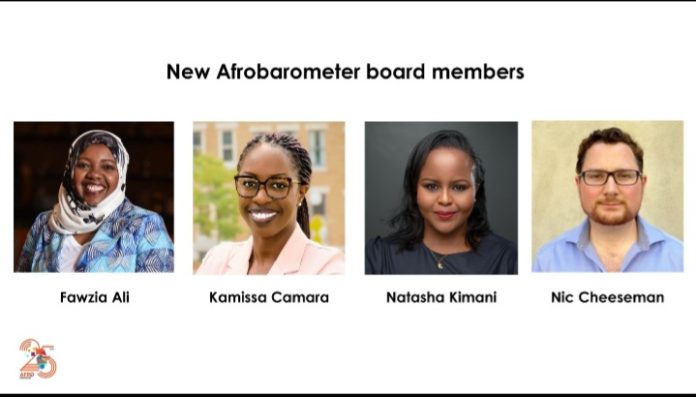Four distinguished thought leaders with collective expertise spanning governance, international diplomacy, social justice, and telecommunications have joined Afrobarometer’s board of directors.
The new board members, who were inducted during Afrobarometer’s 25th-anniversary celebrations in Accra in July, are:
Fawzia Ali, chief consumer business officer at Safaricom, a leading telecommunications company in Kenya.
Her career spans finance, marketing, sales, customer experience, product development, and enhancing engagement through personalised communication.
Ali is also a board member at the Safaricom Foundation and Moving the Goal Posts, where she has headed the audit and finance committees.
Kamissa Camara, professor of practice in international diplomacy at the Gerald R. Ford School of Public Policy, University of Michigan.
Ambassador Camara is a senior Africa adviser at the United States Institute of Peace and a non-resident scholar at the Middle East Institute.
She has held strategic positions in the Malian government, including minister of foreign affairs, chief of staff to the president, and minister of digital economy and planning.
A respected voice in global media, she contributes to CNN, Al Jazeera, and the BBC on African and global politics. Ambassador Camara is finalizing her doctoral studies in political science at the University of Oxford.
Natasha Kimani, an advocate of the Kenyan High Court with more than 15 years of experience in gender mainstreaming, social justice research and activism, gender-based violence prevention and response, and protection.
Kimani has been instrumental in drafting gender-responsive policies and legislation in Kenya.
She has worked with prominent organizations and institutions, including the Kenya Law Reform Commission, the Commission for Implementing the Constitution, and the Ministry of Foreign Affairs, collaborating with both national and county government agencies.
Nic Cheeseman, professor of democracy at the University of Birmingham and former director of the African Studies Centre at the University of Oxford.
Cheeseman’s research focuses on democracy, elections, and development, and he has authored and edited more than 10 books, including the acclaimed How to Rig an Election.
His numerous awards include the GIGA Award for best scholarly article in comparative area studies and the Frank Cass Award for best article in Democratization.
His insights as a frequent commentator on global events have been featured in leading publications such as the Economist, Le Monde, the Financial Times, and the New York Times.
Afrobarometer Board Chair E. Gyimah-Boadi said the additions will strengthen the research network’s efforts to amplify the voices of African citizens through reliable data and insightful analysis.
“The new Afrobarometer board members significantly reinforce our strengths in terms of diversity, technical expertise, and regional representation,” Gyimah-Boadi said.
“As young leaders who are highly accomplished in their respective fields, they will help us carry the Afrobarometer vision forward to the next generation.”
Afrobarometer survey
Afrobarometer (AB) is a trusted source of high-quality data and analysis on what Africans are thinking. With an unmatched track record of 385,000+ interviews in 42 countries, representing the views of more than three-fourths of the African population, AB is leading the charge to bridge the continent’s data gap.
AB data inform many global indices, such as the Ibrahim Index of African Governance, Transparency International’s Global Corruption Barometer, and the World Bank’s Worldwide Governance Indicators.
The data are also used for country risk analyses and by credit rating and forecasting agencies such as the Economist Intelligence Unit.
All AB data sets are publicly available on the website and may be analysed free of charge using AB’s online data analysis tool.







































